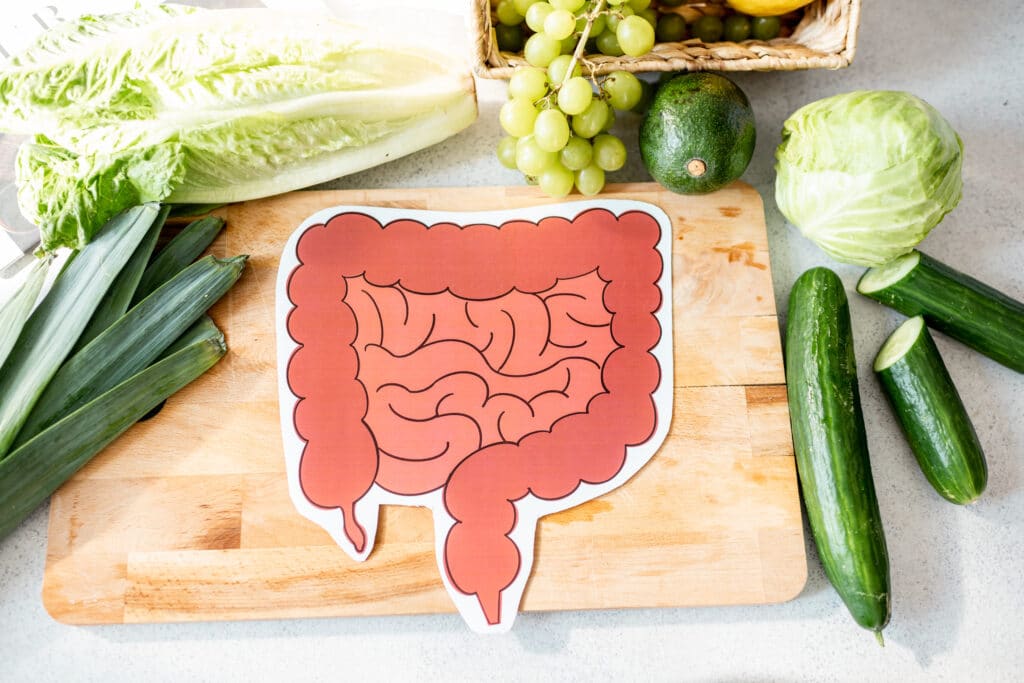Become a Gut Health Expert
Whether you’re looking to add to your professional skills, carve out a space in this niche, or support your own health, becoming a Gut Health Nutrition Specialist will give you the knowledge and tools to support and optimize gut health.

What You’ll Learn
- The role of the gut in overall wellness, from the gut microbiome’s connection with the immune system to its communication with the brain
- What can disrupt the gut and why so many people struggle with gut health
- The latest nutritional strategies to support a healthy gut microbiome and heal the gut
This Course is For You If…
- You are a nutrition or wellness professional that wants to specialize in a growing niche.
- You work with clients with digestive issues or autoimmune conditions, including IBS, SIBO, Celiac disease, or Crohn’s.
- You want to holistically address your or a loved one’s gut issues.
- You want to optimize your physical, mental, and emotional health.

What Can I Expect From The Program?

Up-To-Date Curriculum
Features the latest research on nutrition, holistic health, and health behavior change

Dynamic Learning Methodologies
Includes a variety of learning methodologies to support different types of learners

Handouts & Real-Life Tools
Download and refer to dozens of helpful nutrition and lifestyle resources

Business Resources
Offers support for applying the knowledge and skills gained in the program in a professional setting

Affordable Financial Investment
Costs less than the market value and is payable through a payment plan

Flexible Course of Study
Can be completed online, from anywhere and at any time
What You’ll Get When You Enroll

- 8 online modules with the knowledge necessary to support clients in optimizing their digestive wellness through nutrition and lifestyle
- 23 handouts you can download and print to use with your clients or refer to later
- Multimedia and resources to deepen your understanding of course content
- 5 engaging case studies and 3 activities to put your newly acquired knowledge into practice
- Access to up-to-date scientific articles about gut health nutrition
- Tools you can use with your clients to better understand their gut health status
- A toolbox of dietary strategies for addressing specific gut health issues
- A toolbox of lifestyle strategies for supporting gut health in the long term
- Information about research-backed herbs, botanicals, supplements, and probiotics that bring the body back into balance
A Look Inside The Curriculum
Module 1: Introduction to Gut Health Nutrition Answer
- What is Gut Health?
- Why is Gut Health Important?
- An Introduction to a Functional Approach to Gut Health
- The Impact of Genetics and Health Behaviors on Gut Health
- How Does Diet Impact Gut Health?
Module 2: Gastrointestinal Anatomy & Physiology Answer
- The Digestive System
- Brain to Stomach
- Small and Large Intestines
- Accessory Organs
Module 3: The Human Gut Microbiome Answer
- Symbiosis
- Prebiotics and Probiotics from Food and Supplements
- Dysbiosis
Module 4: Inflammation, Stress, & The Gut-Brain Connection Answer
- The Enteric Nervous System
- Immunity and Inflammation
- Stress
Module 5: The Impact of Nutrition on Gut Health Answer
- The Impact of Key Nutrients on the Gut
- The DIGIN Model and the 5 Rs
- Eating Principles and Healing Dietary Protocols
- Therapeutic Elimination Diets
- Restorative Foods for Healing
Module 6: Nutritional Healing Options for Digestive Health Imbalances Answer
Nutritional Strategies for Faulty Digestion with Symptoms in:
- The Mouth
- The Esophagus and Stomach
- The Liver
- The Pancreas
- The Gallbladder
- The Small Intestine
- The Colon
Module 7: Lifestyle Strategies & Approaches for Optimal Gut Health Answer
- Wellness as a Lifestyle
- Eating Principles for Health and Wellness
- Balancing Life Stress
- Cleansing and Detoxification
Module 8: Special Topics in Gut Health Answer
- Food Allergies, Intolerances, and Sensitivities
- Psychobiotics and Mental Health
- Athletes and Sports Nutrition
- Anti-Nutrients
- Social and Environmental Factors
- The Gut Health of Children
Learn How to Support Whole Body Health and Wellness by Optimizing Gut Health
- Discover everything the gut has to offer – from the microbiome and how it fights disease to its relationship with the rest of the body.
- Get the most up-to-date, evidence-based nutritional strategies for supporting your gut through different life stages.
- Become a gut health expert by studying at your own pace from anywhere in the world.

What Other Students Are Saying

“I’ve really enjoyed taking the AFPA Gut Health Nutrition Specialist course. The content was well-delivered and easy to understand. I love that you can study at your own pace and that all the material is available for download to refer to and use in my coaching practice. The course covers a wide array of content and I found much of it to be fascinating!”
— Susan W., Gut Health Nutrition Specialist
FAQ
How long does it take to complete this course? Answer
The program is designed to provide you with flexibility and ample time to progress at a pace that is comfortable to you. It is self-directed, self-study, and may be completed in six months or less. If you require more time, you can request a six-month extension for a fee of $75.
How soon can I start this course? Answer
We have open enrollment, so you may enroll whenever you are ready. Shortly after completing your purchase, we will grant you access to the learning portal where you can begin your course.
Are there payment plans available? Answer
Select Affirm at checkout to split your purchase into monthly payments starting at 0% APR with no hidden fees.
Pick the loan that fits your budget and make payments over three, six, or 12 months. Our payment plans offer instant approval and are safe and secure.
What are the requirements to enroll in this course? Answer
You must be at least eighteen years old and have a solid understanding of the English language to enroll in this program. We also recommend (but do not require) that you:
- Hold at least one current certificate in a health, wellness, nutrition, or fitness discipline (OR) have an undergraduate degree in a health or science discipline
- Have knowledge of health and wellness coaching strategies and practices
How long does it take to complete this course? Answer
The program is designed to provide you with flexibility and ample time to progress at a pace that is comfortable to you. It is self-directed, self-study, and may be completed in six months or less. If you require more time, you can request a six-month extension for a fee of $75.
How do quizzes and exams work? Answer
All quizzes, exams, and assignments are online, open book, and can be completed when you’re ready.
You must score at least 80% on all quizzes and the final exam to pass and receive your credential and a certificate of completion. You may take a quiz as many times as you need to pass. If you don’t pass the final exam, you can request a retest for a fee of $75.
Do I need to complete continuing education to maintain my certificate? Answer
Yes, you will need to complete at least 16 continuing education credits (CECs) every two years to maintain your certificate. You can learn more about renewing your certificate here.
Can I earn continuing education credits for completing this certification program? Answer
Yes! A newly acquired AFPA certification has a value of 16 continuing education credits (CECs) that count toward the renewal requirements of an existing AFPA certification. To qualify for CECs, you must successfully complete the certification program.
What is gut health? Answer
The gut includes all the body parts and organs involved with taking in and putting out the foods we eat, including the mouth, esophagus, stomach, small intestine, pancreas, liver, gallbladder, colon, and rectum. When we talk about gut health, though, we’re also talking about:
- The gut microbiome, the trillions of good and bad bacteria that live in the gut
- The relationship the rest of the body has with the gut microbiome
- The role the gut plays in immune function
- The communication channels between the gut and the brain
- The impact the gut has on overall wellness
Why is gut health important? Answer
Gut health is essential because it impacts numerous aspects of overall health and well-being. A healthy gut microbiome supports:
- Digestion: A well-functioning gut aids in the digestion and absorption of nutrients, ensuring the body receives essential vitamins, minerals, and energy from food.
- Immune System: The gut is home to a significant portion of the immune system. A balanced gut microbiome helps defend against infections and promotes immune tolerance.
- Mental Health: The gut-brain axis facilitates communication between the gut and brain, influencing mood, stress levels, and mental well-being.
- Metabolism: The gut microbiome can impact metabolic processes, including how the body stores and uses energy.
- Protection Against Pathogens: Beneficial gut bacteria act as a barrier against harmful pathogens, preventing them from establishing themselves in the gut.
- Detoxification: The gut plays a role in eliminating waste and toxins from the body.
Imbalances in the gut microbiome, often referred to as dysbiosis, can contribute to a range of health issues, including gastrointestinal disorders, autoimmune diseases, diabetes, and mental health conditions. Therefore, maintaining a healthy gut through proper nutrition, lifestyle choices, and targeted interventions is crucial for overall health and longevity.
How does diet impact gut health? Answer
Diet significantly impacts gut health as it directly influences the composition and activity of the gut microbiome. The foods we eat provide nutrients not only for us but also for the trillions of microorganisms residing in our gut. Consuming a diverse range of foods supports the growth of diverse beneficial gut bacteria. High-fiber foods, prebiotics, and probiotics promote the growth of beneficial bacteria and nourish the gut microbiome. Staying adequately hydrated and identifying and avoiding food sensitivities can also be beneficial for gut health.
A balanced and nourishing diet that supports the gut microbiome can profoundly impact digestion, nutrient absorption, immune function, and overall well-being.
What Is the gut brain connection & how does it impact health? Answer
The gut-brain connection, also known as the gut-brain axis, refers to the bidirectional communication system between the gastrointestinal tract (the gut) and the central nervous system (the brain). This intricate communication pathway involves the gut, the brain, and the gut microbiome, and it plays a significant role in influencing various aspects of health, including mental well-being and overall physiological balance.
The gut produces and releases neurotransmitters, including serotonin and dopamine, which are associated with mood regulation. The gut microbiome interacts with the gut-brain axis, influencing the production and signaling of neurotransmitters. Stress and emotional states can influence gut function and microbiome composition, while chronic stress can lead to imbalances in the gut microbiome and contribute to gastrointestinal disorders. The vagus nerve, a major nerve connecting the gut and brain, plays a crucial role in transmitting signals and information between the two systems.
An imbalanced gut microbiome can trigger chronic inflammation, which has been linked to mental health disorders like depression and anxiety. Additionally, emerging research suggests that the gut-brain axis may play a role in conditions like Parkinson’s disease and Alzheimer’s disease.
By understanding and nurturing the gut-brain connection, individuals can maintain mental and emotional well-being through stress management techniques, a balanced diet supporting gut health, regular physical activity, and sufficient sleep.
Are there any restrictions in my state regarding what I can do as a Gut Health Nutrition Specialist? Answer
The laws around health and wellness practitioners can be confusing, especially because they differ from state to state. Check out this guide to help you better understand those laws, the different types, and how they impact your ability to practice. To learn more about the laws impacting you, browse by state here.
Can I speak with an Enrollment Specialist before signing up? Answer
To speak with an Enrollment Specialist, email us at [email protected] or call us at 800.494.7782.
Payment Plans Available Starting at 0% APR
Choose from 3, 6, or 12 months. Instant approval. Safe and secure.





